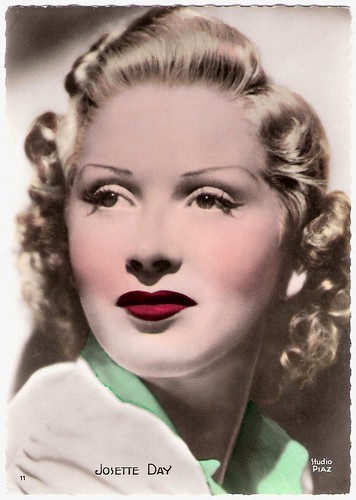
French postcard by Editions P.I., Paris, no. 11. Photo: Studio Piaz.
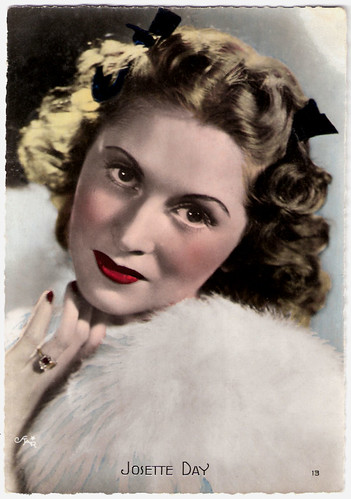
French postcard by Editions O.P., Paris, no. 15. Photo: Star.

French card, no. C142. Photo: Aldo. Jean Marais andJosette Day in La belle et la bête/Beauty and the Beast (Jean Cocteau, René Clément, 1946).
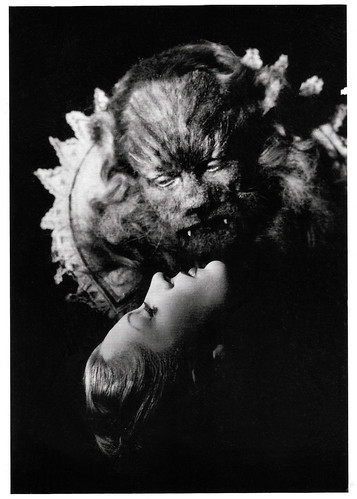
Swiss postcard by News Productions, Baulmes, no. 56515, Photo: Collection Cinémathèque Suisse, Lausanne. Jean Marais and Josette Day in La belle et la bête/Beauty and the Beast (Jean Cocteau, René Clément, 1946).
Seven films in a year
Josette Day was born as Josette Noëlle Andrée Claire Dagory in Paris, in 1914. At the age of five, she began her film career in Ames d'orient/Souls of the Orient (Léon Poirier, 1919). Till 1922 she made three films under her real name, Josette Dagory. She also performed as a dancer, including a stint in the Paris Opera. An injury curtailed her career in dance when she was only 9 years old.
She did not return to the screen until she was an adult but then her film career soon took off. The sound film was recently introduced. As Josette Dagory she played the female lead in Serments/Oaths (Henri Fescourt, 1931) and Un bouquet de flirts/A bouquet of flirtations (Charles de Rochefort, 1931).
Then she changed her name to ‘Day’. Throughout the thirties she made numerous films, sometimes as many as seven in a year. Among her early sound films were the romantic comedy Allo Berlin? Ici Paris/Here's Berlin (Julien Duvivier, 1932), Coralie et Cie/Coralie and Company (Alberto Cavalcanti, 1933) starring Francoise Rosay, and Die Abenteuer des Königs Pausole/The Merry Monarch (Alexis Granowsky, 1933).
Die Abenteuer des Königs Pausole/The Merry Monarch was a Tobis production, that was made in German, French and English versions. In all three alternate language versions, she was the leading lady opposite the famous Emil Jannings.
Later films were Les filles de la concierge/The Daughters of the Caretaker (Jacques Tourneur, 1934), Lucrèce Borgia/Lucrezia Borgia (Abel Gance, 1935) starring Edwige Feuillère, Ménilmontant (René Guissart, 1936), and L'homme du jour/The Man of the Hour (Julien Duvivier, 1937).
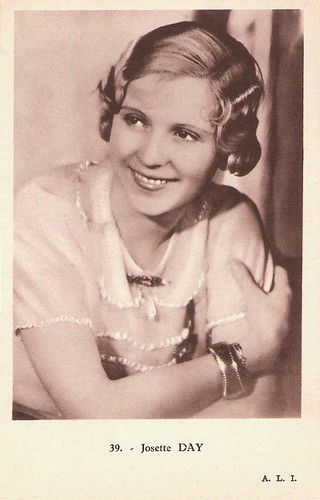
French (?) postcard by A.L.I., no. 39.
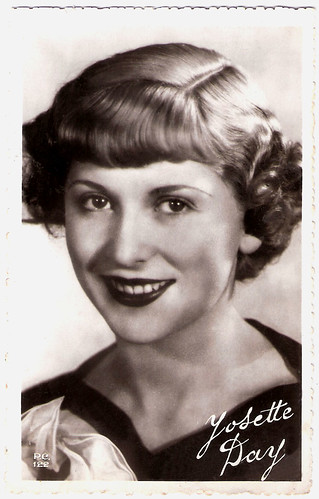
French postcard, no. PC 122.

French postcard by Editions et Publications Cinematographiques. Photo: Studio Arnal, Paris.

French postcard by A.N., Paris, no. 1009. Photo: Paramount. Collection: Didier Hanson.
Classic French fairytale
In 1939, Josette Day met Marcel Pagnol and they had an affair. Pagnol was a famous French author, producer and director who owned his own film studio. Some sources say they were married, but on 2 July 1978, the French newspaper Le Monde ran a correction of its obit of the day before. The union of Josette Day and Marcel Pagnol "was never consecrated by a marriage."
Her first great role was as Patricia Amoretti in his production La Fille du puisatier/The Well-Diggers Daughter (Marcel Pagnol, 1940) with Raimu and Fernandel. The couple also made Monsieur Brotonneau/Mr. Brotonneau (Alexander Esway, 1939) starring Raimu, La prière aux étoiles/The Prayer to the Stars (Marcel Pagnol, 1941) and Arlette et l'amour/Arlette and Love (Robert Vernay, 1943). Day left Pagnol in 1944. Most of her films seem forgotten over time, except for one film for which she will always be remembered in the history of French cinema.
In 1946, she played Belle in the classic French fairy tale La belle et la bête/Beauty and the Beast (Jean Cocteau, René Clément, 1946) opposite Jean Marais as the Beast. At French Films, James Travers reviews: “This is one of the most important films in the history of cinema. By pushing film technology to its creative limits and avoiding sentimentality, Jean Cocteau succeeds in creating a film that is both visually entrancing and emotionally rewarding, whilst re-telling a familiar tale in a fresh and innovative way. (…) Of course, Cocteau is well-served by some great acting talent, in the form of Jean Marais and Josette Day as the lead characters.”
Two years after La belle et la bête she appeared opposite Marais in Cocteau’s Les parents terrible/The Terrible Parents (1948), and she also appeared in his lost film Coriolan (Jean Cocteau, 1950). Other interesting films were La révoltée/Stolen Affections (Marcel L’Herbier, 1948) with Victor Francen, and Swiss Tour/Four Days Leave (Leopold Lindtberg, 1950) with Cornell Wilde and Simone Signoret. She was only 36 years old when she suddenly ended her career. She retired to marry a wealthy Belgian businessman, Maurice Solvay, whom she had hidden from the Nazis during World War II. She was only seen once in another film, as herself in the comedy L'amour, Madame/Love, Madame (Gilles Grangier, 1952) with Arletty and François Périer.
In the last years of her life, she devoted herself to charitable work. In 1960 her husband died. Josette Day died in 1978 in Paris. She was 63. But was she really dead? 17 years later, Micheline Weill, an American woman living in a Philadelphia row house begged to differ. In the Philadelphia Inquirer, she proclaimed: "I Am Alive" in lilting French. True? The writer, Leonard W. Boasberg, ends his article thus: "One thing is certain if anything is certain in this world: She is not lying. She truly believes herself to be Josette Day. Possibly, her friend Tom Brady says, she is just a sweet and charming but confused old woman. On the other hand, he adds, if it seems almost too good to be true that she is Josette Day, that doesn't mean it isn't true."
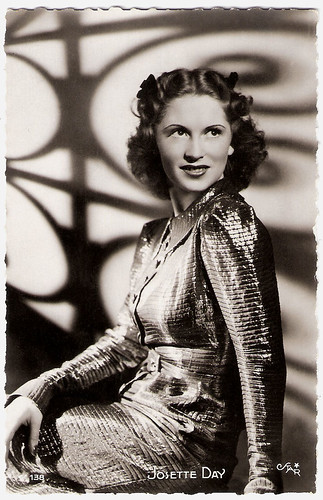
French postcard by Editions P.I., no. 138. Photo: Star.

French postcard by Viny, no. 55. Photo: Star.

French postcard by Editions P.I., no. 138. Photo: Studio Carlet Ainé.
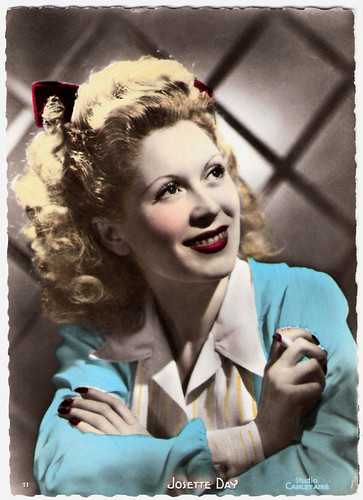
French postcard by Editions P.I., no. 11. Photo: Studio Carlet Ainé.
Trailer for La Belle et la bête (1946). Source: Criterion Trailers (YouTube).
Sources: James Travers (French Films), Bob Hufford (Find A Grave), Frankfob2 (IMDb), Leonard W. Boasberg (Philadelphia Inquirer), Lenin Imports (now defunct), Wikipedia and IMDb.
This post was last updated on 5 December 2023.
1 comment:
Perhaps she was still alive. Certainly a fitting end for a fairy tale career
Post a Comment